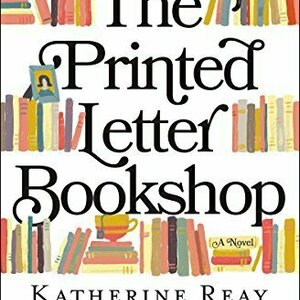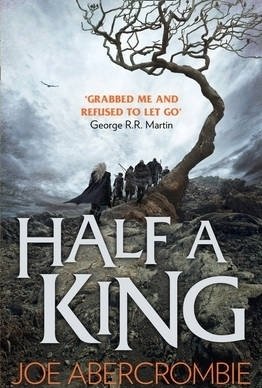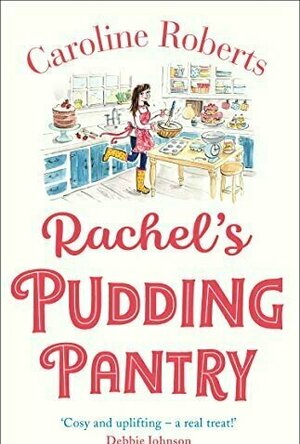Heather Cranmer (2721 KP) rated On Bone Bridge in Books
Aug 25, 2018
The pacing for On Bone Bridge starts off slowly for the first few chapters. However, it quickly picks up soon enough. Once the pacing picked up, I didn't want to put this book down. I couldn't wait to find out what happened next and to find out what Kay knew. I also couldn't wait to find out if Oliver would be alright.
The plot for On Bone Bridge is definitely an interesting one. I also don't believe it's been done too many times. When Violet-May's and Rosemary-June's infant brother, Alexander, falls off of a bridge and drowns, everyone thinks it was just a horrible accident. However, Kay has her suspicions that it wasn't. We read about this time in her life. Then we read a little about when she's a teen, followed by her twenties. It's when she's in her late 30's that she crosses paths with the Duff family. She is invited by Rosemary-June's and Violet-May's brother, Robbie, to come leave with them in their house to keep an eye on things. Rosemary-June now has two kids of her own. A 3 year old girl named Caroline and an 18 month old named Oliver. When strange things start happening to Oliver, Kay starts to wonder if they are by accident or if something more sinister is going on as well as wondering if this is all connected to that day on Bone Bridge when Alexander drowned. Anyway, the plot is written very well. There are a few plot twists including one which could be predictable. However, On Bone Bridge is still a fantastic read. All of my questions were answered, so it was nice to have closure.
I enjoyed the world building in On Bone Bridge. This book definitely had me feeling some emotions for sure! Anyway, most of the book takes place in Ireland at different time periods. I think the author, Maria Hoey, did an excellent job in making the reader feel as if they were right there whilst everything was happening. I loved how most of the story also takes place at the Duffy family home. Kay was in awe of the house when she was little, so it was nice to read more about the place.
Trigger warnings include the death of a child and an animal, a spoiled child, swearing, violence (although not much and not very graphic), drinking, and cheating.
Overall, On Bone Bridge is a fantastic read. It's got a very interesting and strong plot as well as likable characters. The world building is written well too. I would definitely recommend On Bone Bridge by Maria Hoey to everyone aged 15+ who loves reading.
Debbiereadsbook (1669 KP) rated WHo We Truly Are (Enhanced #2) in Books
Oct 26, 2018
This is book two in the Enhanced Series, and you really SHOULD read or listen to book one, Five Minutes Longer, before you start this one. It's a continuation of Talon and Finn's tale, and not all is repeated here.
Talon and Finn are partners in all ways, it's just not common knowledge. When Finn is sent undercover to try to locate the missing Enhanced children, Talon has to dig deep within himself to let Finn do his job, and then for Talon to do his, when Finn turns up missing too.
For most of this book, I wanted to punch Talon in the face so bloody hard!! He's such an idiot when it comes to Finn doing his job, he really is! I get he cares for Finn, very much so, but Finn came into Talon's world as his WORK partner, and that has to be front and centre. But no, Talon's reaction to Finn going undercover is to bury his head in the sand, and ignore Finn. So much so, Finn thinks to leave Florida and find himself some who really appreciates him.
But in Talon's defense, he is dealing with his ever increasing powers, taking on the powers of the other team members, and it does take its toll on him.
I found this one a little more explicit than book one, as Talon and Finn's physical relationship seems to be the outlet for their work situations frustration, for BOTH of them. No complaining, min, no ma'am not at all! Even though I wanted to punch Talon, he does somewhat redeem himself when they get home!
The missing children has *some* conclusion, but there are still some unanswered questions. We meet some new people, both Enhanced and regular.
When Talon finally gets his head out his ass, and *literally* explodes, it's Finn that brings him back from the brink. Finn's words said to him, that words Talon longed to hear, and indeed say, manage to clear his mind and focus in time to save them both.
Nick J Russo again narrates. I love his narration again. His voices are clear, and consistent across both books, and I have no trouble following multi person conversations. His reading voice is deep and even, making it such an easy listen!
Russo gets all of Finn's emotions when Talon almost blanks him, and I felt for Finn, I really did. Listening to a book is such a different experience to reading, and the narrator makes listening to this book such a pleasure.
Of course, a narrator can ONLY reads the words he's given and if Victoria Sue continues to write about these guys, I'm gonna be listening! (I don't like to flip between listening and reading in a series, I find I lose something if I do!)
Off to listen to book three, Beneath The Mask. I've a feeling Gael is in a world of hurt and the guys don't really know how deep it goes!
5 stars for the book
5 stars for the narration
5 stars overall
**same worded review will appear elsewhere**
MaryAnn (14 KP) rated The Printed Letter Bookshop in Books
Nov 4, 2019
When attorney Madeline Carter inherits her aunts bookstore in a small town north of Chicago, she plans to sell it and add the proceeds to her nonexistent investment portfolio. But plans change when Madeline discovers the store isnt making money and she gets passed over for promotion at her firm. She quits in protest, takes the train north, and decides to work at the store to prep it for sale. Madeline soon finds herself at odds with employees Jessica and Courtney; when she also finds herself attracted to an affianced man, it only confuses the entire situation. After blowing up her marriage two years earlier, Janet has found solace working at the bookstore and a kindred spirit within its owner, Maddie Cullen. But when Maddie dies and her niece, Madeline, barges in like a bulldozer, Janet pushes at the new owner in every way-until she trips over common ground. Soon the women are delving into online dating and fashion makeovers, and Janet feels the pull to rediscover her art, a love she thought long behind her. After a night of bad decisions leaves the store in peril, Claire arrives and tries to save the day. While she, too, found sanctuary in the little bookstore, she knows its under-insured, in the red, and will never survive. When she discovers her teenage daughter has played a part in vandalizing the store, Courtney taps into strength she didnt know existed or had long forgotten. The quietest of the three, she steps up and finds a way to save her family, the store, and the precious friendships that have grown within it. The Printed Letter Bookshop is the story of friends who find each other-and themselves-in a place none of them ever expected.
This is a wonderful read. It's hard to put down once the reader begins the story. One shop, three women and their lives are connected through one woman, Aunt Maddie. In this story, we learn through three women how one magnificent woman helps each woman, Madeline, Janet, and Claire take a look into their lives through books that she has left them to read after her death.
I love bookstores, and this one is more than a bookstore; it's a place where friends come together for love, help, and healing. It's about friendships that can last through trials and tribulations. It's about one woman's legacy and how she looked at life. It's a story that one should not miss.
This is a story of finding one's calling in life, of love, forgiveness and true friendships that last through trials and tribulations, not just in the good times but in the worst of days. This was a wonderful book that teaches us that reading is beneficial, soothing and can always be a learning experience.
I loved the shop; I wish it were real if it were I would visit everyday!
Phil Leader (619 KP) rated Half a King (Shattered Sea #1) in Books
Nov 14, 2019
I needn't have worried. It seems all Abercrombie has done is create his usual cast of dark, mysterious, vengeful and misfit characters, set them on a bloody quest during which they can philosophise, complain and make pithy remarks to each other while hacking their enemies into pieces. It seems the only nods to being a 'Young Adult' book is that there is no sex and maybe some of the gore has been turned down a notch. The writing, the plot or the characters don't suffer from this at all.
The plot concerns Yarvi, youngest son of the king in a land where strength and ability in battle is everything. However Yarvi was born with a deformed hand and he is an embarrassment to his father and fated to join the ministry - which normally only women do - to become and adviser to a king rather than a king himself.
However destiny strikes a cruel blow when his father and older brother are both killed. Yarvi is now the king - unprepared as he is and as unpopular as he is with his subjects. He is soon betrayed and sets out on a quest for revenge.
This is pure Abercrombie from start to finish. Yarvi's journey takes him from being a king to being the lowest of the low - if not lower. He might lack the strength or ability to fight but he has wisdom, knowledge, cunning and a thirst for revenge to make up for that. From a lonely and unhappy child he becomes a leader of men - and women - and has to fight for survival across a continent to get home to take his rightful place at the throne.
The book is perhaps a little slow to start - until Yarvi is betrayed - but it is essential that this time is taken to lay the groundwork for what follows. Once it gets going the book races along with barely a stop for breath as events carry the young hero along, sometimes with some control of the situation but often just as much a bystander as the reader. There are characters aplenty - some plain mean and nasty, some friendly and amusing, some mean and nasty and amusing. As would be expected from Abercrombie nobody falls into a neat pigeonhole or trope. When deaths among Yarvi's comrades occur they are touchingly written - but with the senseless random nature of war and death writ large across their last words.
Definitely a great read, hope it will not be so long before the next in the series.

Cyanide and Happiness : Daily web comics, news, and videos
Entertainment and Lifestyle
App
Thanks to everyone for making Cyanide and Happiness the #1 Paid App in Entertainment and the #3...

Finnish <-> English Slovoed Compact talking dictionary
Reference and Education
App
#1 DICTIONARY TECHNOLOGY IN THE WORLD 16 000 entries and 10 000 English audio pronunciations...

AltiFondo for Garmin Connect
Health & Fitness and Sports
App
AltiFondo is a full-featured Garmin Connect™ client for Col Hunters which detects automatically...
Ivana A. | Diary of Difference (1171 KP) rated Rachel's Pudding Pantry in Books
Oct 2, 2020
Rachel’s Pudding Pantry is a story about Rachel, who is a farmer in the modern world, living with her mum Jill and her little daughter Maisy. Rachel and her family has been dealing with a lot of grief in the last couple of years, and are struggling financially to keep the farm running.
The one thing that glues this family together, and keeps them happy is the baking and the making of lovely sweet puddings. They bake all day, especially grandma Jill, and they are the perfect example of what a family should look like – full with joy, love and laughter.
I loved the personality Rachel has;
She always puts her family in the first place, cares about her daughter and mum so much. Everything she is doing, she is doing for them, and she is always positive minded. It was such a refreshing moment for me to find such character.
Rachel and her mum are dealing with grief, losing a person in their family that meant a lot to them. This moment of sadness can be felt throughout the book, and I loved it. It shows that grief is a constant battle – it is not easy to lose someone you love, and you don’t get over it very easily. Years could pass, and you will still have the emptiness in your heart. I felt this on my skin, when I lost my grandfather in January. Even after three months, I still think of him every single day, and hope that he is looking over me and is proud of who I have become.
I was also very positively pleased with the other supportive characters surrounding Rachel’s story. Tom was the perfect neighbor – the one you always call for help and will always help you when you need him. He is always caring and trustworthy, and sometimes, I felt awkward when Rachel always came to him for help. Knowing myself, I would be so embarrassed to keep asking for help.
Then we have her best-friend Eve. She was my superhero, and a friend anyone would wish for. She was always supportive, always there for Rachel with her never-ending love. It is a priceless relationship these two ladies have, and I couldn’t help but be a massive fan of them.
The only thing that kept bothering me throughout the book, and is not that big of a deal anyways, was the fact that despite their financial struggles, Jill kept baking for like thirty people every single day (this is before they started the new business). If that was me, I wouldn’t bake that often. I guess it was a fact that just stuck with me for a while.
Even though it is not my usual read, I honestly really enjoyed this book. I am seriously considering giving this genre more time, and reading more books similar to this.
It was a quick, pleasurable read. It always made me feel happy and content, and eager to go in the kitchen and bake some sweets. Because I am a lazy one, I just bought sweets and ate them instead. Tell you what – that also works quite fine!

African Proverbs
Reference
App
Baganda * One who loves you, warns you. Ethiopian * Evil enters like a splinter and...
Heather Cranmer (2721 KP) rated Mistletoe Miracles (Ransom Canyon #7) in Books
Sep 12, 2018
The pacing for Mistletoe Miracles was spot on. It wasn't a fast paced book, but it wasn't slow paced either. It moved at a nice relaxing pace, and I found myself loving it.
The plot for Mistletoe Miracles is a sweet one. It was interesting to see each couple's relationship blossom. Mallory is on the run from her abusive ex-boyfriend. She ends up in a car crash. Her dog is also injured in the crash. Little does Jax know he has her dog, but once he figures it out, it's the start of something sweet. Griffin needs a rich bride in order to save his working ranch that's been in the family for generations. Sunlan, a ranch girl herself, is just the right woman to fill that position. She's also looking for someone to take her away from her overbearing father. Wyatt is a soldier just looking for a place to rest while on leave. With everyone assuming he's Jamie's husband, he is taken to Jamie's house after he falls asleep and has a small crash. Jamie has been out of town, but when she returns, she's gets the biggest surprise of her life. However, she's been telling everyone she's married even though she's not. Wyatt may just be the (pretend) husband she needs. The reader has the pleasure of reading about each immersive relationship and how each one blossoms in its own way. There are no major plot twists, but Mistletoe Miracles is a book that doesn't need plot twists to be enjoyable. All loose ends are also tied up by the end of the book which I was happy about. I also liked that Mistletoe Miracles can be read as a standalone.
I felt that the world building in Mistletoe Miracles was done very well. Jodi Thomas makes it so easy to feel as if you are one of the characters in her book. She puts you right in the midst of everything that is happening, and it is so easy to lose yourself within each page of the story. Mistletoe Miracles takes place in Texas which made me enjoy the book even more! The world building is so realistic in this novel that I would lose track of time whenever I was reading it.
I loved every character in Mistletoe Miracles. I felt each character was fleshed out substantially, and every character felt like they were an actual real person instead of a character in a book. My favorite characters in this book were Sunlan and Griffin. I loved how they started out a bit distant towards each other, but eventually, they warmed up to one another and came out of their shell, especially Sunlan. Don't get me wrong, I loved the other characters too, but it was Sunlan's and Griffin's relationship that I loved the most. I did enjoy reading about all the other character's relationships as well, and I found them to be very interesting. Each character had something to bring to the table to make Mistletoe Miracles the great read it is.
There aren't many trigger warnings for Mistletoe Miracles. I would classify it was a clean romance. There's no swearing and no steamy scenes. There is some violence although it is not graphic. There is some drinking of alcohol as well as kissing. There's also talk about making love but everything is implied and not described in graphic detail.
Overall, Mistletoe Miracles is a very sweet and refreshing read that will warm even the most hardened hearts. It's got very likable and realistic characters characters, an interesting plot, and fantastic world building. I would definitely recommend Mistletoe Miracles by Jodi Thomas to everyone aged 16+ whether they like romance or not. This is one of those books that everyone should read even if romance isn't their preferred genre.
(Thank you to Netgalley for providing me with a copy of this title in exchange for an honest and unbiased review.)





